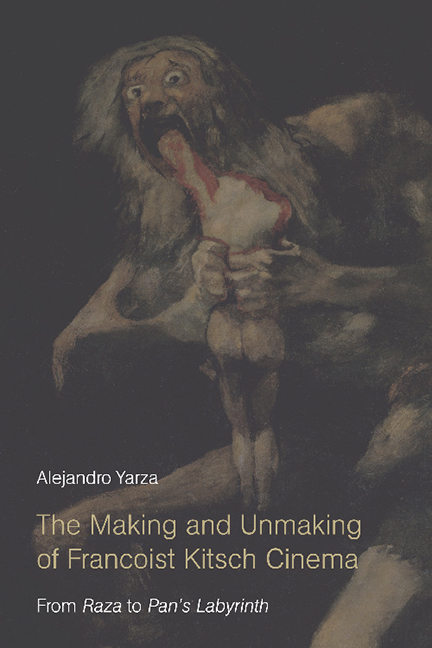Book contents
- Frontmatter
- Contents
- List of Figures
- Acknowledgments
- Preface
- Introduction
- 1 The Petrified Tears of General Franco: Kitsch and Fascism in José Luis Sáenz de Heredia’s Raza
- 2 Romancero Marroquí and the Francoist Kitsch Politics of Time
- 3 Los últimos de Filipinas: The Spatio-temporal Coordinates of Francoism
- 4 Surcos: Neorealism, Film Noir, and the Puppet Master
- 5 Franco, Ese Hombre: From Kitsch-Artist to Kitsch-Man
- 6 Viridiana: The World, the Flesh, and the Devil
- 7 Balada Triste De Trompeta: Of Ghosts and Clowns
- 8 Under the Sign of Saturn: The Labyrinth of Moral Choices in Francoist Spain
- Works Cited
- Index
4 - Surcos: Neorealism, Film Noir, and the Puppet Master
Published online by Cambridge University Press: 10 November 2020
- Frontmatter
- Contents
- List of Figures
- Acknowledgments
- Preface
- Introduction
- 1 The Petrified Tears of General Franco: Kitsch and Fascism in José Luis Sáenz de Heredia’s Raza
- 2 Romancero Marroquí and the Francoist Kitsch Politics of Time
- 3 Los últimos de Filipinas: The Spatio-temporal Coordinates of Francoism
- 4 Surcos: Neorealism, Film Noir, and the Puppet Master
- 5 Franco, Ese Hombre: From Kitsch-Artist to Kitsch-Man
- 6 Viridiana: The World, the Flesh, and the Devil
- 7 Balada Triste De Trompeta: Of Ghosts and Clowns
- 8 Under the Sign of Saturn: The Labyrinth of Moral Choices in Francoist Spain
- Works Cited
- Index
Summary
Cinema is the art of the index; it is an attempt to make art out of a footprint
—Lev Manovich, The Language of New MediaRaza, Romancero marroquí, and Los últimos de Filipinas, as we saw in previous chapters, attempted to advance the Francoist political agenda by resorting to a bombastic film style representative of totalitarian kitsch aesthetics. In its unwavering depiction of the stark conditions of Madrid's working-class tenements at the beginning of the 1950s, José Antonio Nieves Conde's Surcos [Furrows] (1951) substantially deviated from this earlier triumphalist Francoist cinema. Although there is general consensus about the film's ultra-conservative political message—like the directors Sáenz de Heredia and Antonio Román, Nieves Conde was a Falangist combatant in the Spanish Civil War—for most Spanish film scholars Surcos is the film that single-handedly revolutionized Spanish cinema by introducing the spirit of Italian neorealism and the bleak vision of film noir.
In the first in-depth analysis of Surcos, Marsha Kinder characterizes Surcos more precisely as a formal hybrid that mixes neorealist cinematic conventions with those of Hollywood, particularly the stylistic conventions of film noir and melodrama. Given the multitude of institutional checkpoints firmly in place that made direct criticism of Franco's regime virtually impossible, Kinder argues, Surcos resorted to an indirect, formally hybrid approach to deliver a powerful critique of Francoism, in which political issues were displaced either onto the domestic sphere of the family through melodrama or onto the “other scene of fiction” through the stylistic conventions of film noir (40).
Contrary to the predominant understanding of Surcos as a legitimate neorealist noir project, I will argue that the film's re-appropriation of Italian neorealism and film noir is brought into sharper focus when seen through the lens of kitsch aesthetics. This lens brings to the fore the inter nal tension between the film's progressive neorealist and noir aesthetics— the former characterized by its humanist emancipatory message, the latter by its holding up a dark mirror to social realities—and its Falangist, right-wing message of the moral collapse of Spanish values under modern, corrupting urban pressure. While exposing Franco's triumphalist lies with acrid determination through its seemingly honest cinematic neorealist noir representation, Nieves Conde's film creates a new set of lies.
- Type
- Chapter
- Information
- The Making and Unmaking of Francoist Kitsch CinemaFrom Raza to Pan's Labyrinth, pp. 102 - 140Publisher: Edinburgh University PressPrint publication year: 2017



